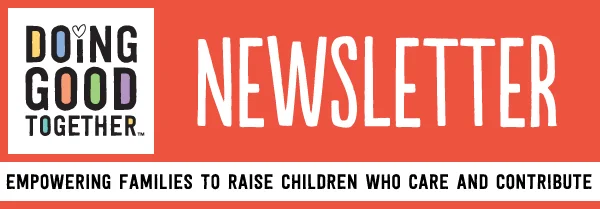THE SURPRISING POWER OF CHORES
For kids, doing household chores can be an early introduction to contributing to the common good. But a 2014 survey suggests that most kids are missing out on this critical lesson. While 82% of respondents said they had regular chores when young, only 28% could say the same of their own children. That's too bad. Surprising research says that doing chores, beginning at age 3 or 4, is actually a proven predictor of adult success. It teaches responsibility, competence, perseverance, the value of hard work -- and the idea that in a family we help one another out. Not surprisingly, children who are regular chore-doers turn into adults who are more likely to respond to other people's needs.
-Jenny Friedman, Executive Director
CO-OP CLEANING WITH KIDS
Make a Difference.....
Here are tips for making chores a natural part of your family's routine.
Start early. Your 2-year-old can put clothes in the hamper or "dust." By age 3 or 4, children can take on certain routine tasks: setting the table, picking up toys and helping make their beds. If older children are new to chores, begin gradually, adding a small task to their to-do list each month.
Work together. When possible, make it a family effort. Dedicate a Saturday morning or Sunday afternoon to chores. Work side-by-side to clean the bathroom, rake the yard or tidy the dining room. Let your kids help choose the jobs they want to do.
Make it a habit. A set routine helps children remember their to-dos. For example, feed the dog every morning before school, clear the dishes every night after dinner, help with laundry every Saturday morning.
Leave money out of it. An allowance can help kids learn to manage money, but don't connect it to chores. Parents who pay their kids for routine household chores create the expectation that every contribution should be rewarded, when in fact chores are simply the price each person pays for being a member of the family.
Make chores age-appropriate and manageable. You are the expert on what chores are doable (but perhaps slightly challenging) for your child. But if you're curious about expectations, check out this list of chores by age.
Be encouraging. Show your child how to do the task, and work with them until they can manage it on their own. Then provide support, not criticism. Even word choice matters. Encouraging them to "be a helper" (rather than asking them to help) and saying "Let's do our chores"
TAKING ON TASKS TOGETHER
Talk About It…
Chat with your children about how your family can work together to get chores done smoothly and pleasantly.
Why do you think it's important that everyone in the family helps out?
What chores do you enjoy most? Least?
What chore would you like to learn to do that you've never tried?
Would you prefer to do chores that are easy or ones that are more challenging?
What would help you remember to do your chores?
What are some ways we can make chores more fun?
Learn About It...
Here are few (adult) books to check out if you're struggling with chore wars at your house. For kids, try to point out instances in children's books of ways characters have household responsibilities.
Cleaning House: A Mom's 12-Month Experiment to Rid Her Home of Youth Entitlement by Kay Wills Wyma
Pick Up Your Socks...and Other Skills Growing Children Need!: A Practical Guide to Raising Responsible Children by Elizabeth Crary
Team Clean: The Ultimate Family Clean-Up-The-House Formula by Carol Paul
INSPIRATION
"No one is useless in this world who lightens the burden of it to anyone else."
-Charles Dickens, author










